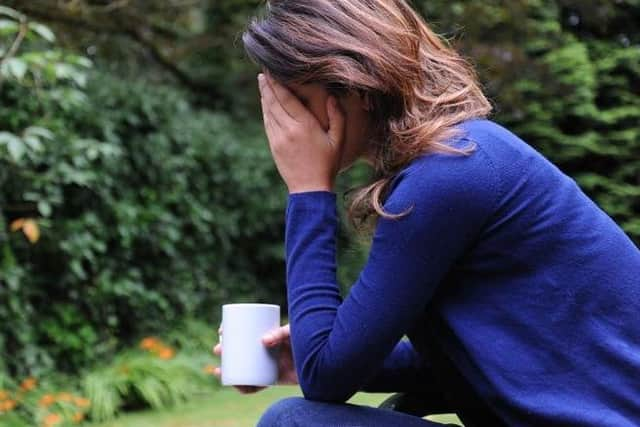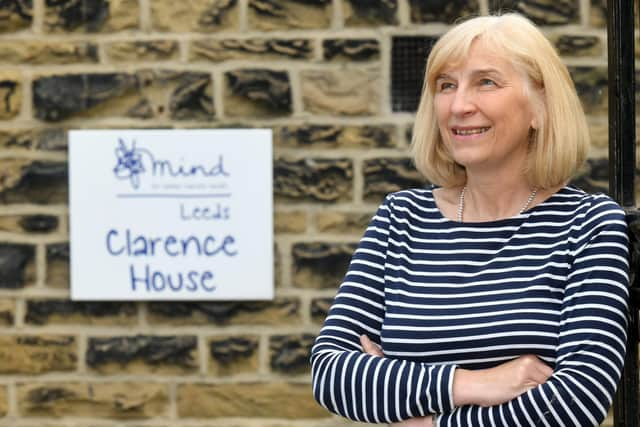Scale of city's mental health crisis laid out as referrals for help increase by more than 100 per cent during the pandemic
and live on Freeview channel 276
One of them is Leeds which tops the tables for clinical commissioning groups (CCGs) that saw the highest rises in referrals for mental health help between February 2020 and March 2021.
There were 4,000 cases referred which was an 118 per cent increase on the previous year.
Advertisement
Hide AdAdvertisement
Hide AdThe figures were taken from 117 CCGs which in total saw 279,995 referrals for help from mental health services for the month of March 2021 alone - that is a 19 per cent increase from 2020.


Referrals for cases deemed urgent or crisis were also at a high in Leeds with the city's CCG group again topping the table for statistics which have compared monthly averages.
The BBC investigation follows the Yorkshire Evening Post's #speakyourmind campaign which for the last three years has been highlighting mental health issues in Leeds.
The report, released today, shows that the monthly average for crisis referrals for the period April 2019 to April 2020 in Leeds was 18.8 cases. For March 2020 to March 2021 it was 97.7 cases - a staggering 419 per cent increase.
Advertisement
Hide AdAdvertisement
Hide AdThe Buckinghamshire CCG was second on the list with 8.5 2019-2020 cases compared to 303.2 2020 to 2021 cases.


The Leeds section of national charity, MIND, said while it could not speculate on why Leeds had higher figures, it was not surprising.
Helen Kemp, chief executive of Leeds MIND said: "It won’t be surprising to many that referrals have risen steeply between March 2020 and 2021. No one knew that we’d still be emerging from the pandemic almost 18 months later, so we saw some people preferring to seek help “when it was over”, rather than engaging with support virtually. They thought that this would only be weeks or a couple of months at most.
"We wouldn’t want to speculate on why the figures are so much higher in our region, as everyone’s experience of mental health difficulties is different."
Advertisement
Hide AdAdvertisement
Hide AdMIND’s head of health policy Geoff Heyes added: “When you see those figures reaching record levels it's a real alarm bell for problems elsewhere in the system, where people aren't getting support quickly enough. Our fear is that more people will be struggling because of the economic impacts that we have yet to see.
"I think this is just a sign that you can't hold back the tide forever and actually there are a lot of people out there who need support and more of them now are in touch with services. "
Referral numbers had plunged by 27 per cent though during the early months of the pandemic, as people struggled to access services through GPs, but have steadily climbed since.
He attributes that drop and rise to a number of factors such as fear of catching COVID by going to the doctor or hospital, a reluctance to seek help because people thought doctors were too busy and the state of some people's mental health getting worse throughout the pandemic and lockdowns.
Advertisement
Hide AdAdvertisement
Hide AdHe added: "In the first wave we had about 60% of people saying that their mental health had got worse over the pandemic but only about 30% of those that actually sought support.
"So there's definitely people holding back from getting support that they actually need and thankfully in the last six months or so of the pandemic we saw the government talking about if you need help go and get it, and that includes mental health services.
"Hopefully we're starting to see that when people do need help they're seeking support more."
This national picture fits with Leeds as Ms Kemp urged people struggling with mental health to seek help.
Advertisement
Hide AdAdvertisement
Hide AdShe added: "All this goes to show just how important it is to seek help early – don’t wait until you can’t cope to reach out for support. A study from Mind earlier in the year showed that 21 per cent did not seek help because they “did not think their problem was serious enough”. So if you’re feeling in need of a little extra support, find some local activity groups, such as Leeds Mind’s Inkwell. And if and when you do need further support, remember that it’s OK not to be OK, and try to be kind to yourself.”
Despite the increase in demand for help, some CCGs saw contact with referrals fall by as much as 40 per cent. Bedfordshire saw 5285 people less which is 42 per cent and the highest of the data examined. Leeds, however, despite topping tables for referrals and crisis cases managed to see contact with patients increase to pre-pandemic levels by 1775 - 14 per cent. Leeds came second in that table behind Blackpool which was 1855 up on pre-pandemic levels and an 83 per cent increase for the area.
A spokesperson for NHS Leeds CCG said: "The CCG in Leeds continues to try to expand capacity to match demand for mental health services and to keep waiting times to a minimum.
“Additional funding is available to do this. Recruitment continues to be a challenge, but we continue to work with the mental health trust and all our mental health service providers to address demand for services whilst continuing to provide the highest quality support possible.”
Advertisement
Hide AdAdvertisement
Hide AdThe investigation also submitted Freedom of Information requests to 53 mental health trusts in England asking how many people per month had been in touch with services. Thirty-two responded and it was found that the Leeds had seen less contact between the Leeds and York Partnership NHS Foundation Trust and homeless people.
Between February 2020 and March 2021 the trust saw 241 less people, which was equivalent to 39 per cent.
Going forward, MIND has called for a "shared understanding of the long term impacts of this."
Mr Heyes said it shouldn't all fall to the NHS as the need for support with other factors such as finances, housing and social care support have an impact on mental health.
Advertisement
Hide AdAdvertisement
Hide AdHe added: "A lot of the provision that actually comes through local authorities, those areas need adequate funding and support because they keep people well, they keep people living in their communities and living at home without needing necessarily to be in hospital, or to be so unwell.
There's definitely a need to concentrate minds on some of the other social impacts and social causes of poor mental health and addressing those because, actually it's exacerbated existing inequalities, it hasn't created these inequalities they've always been there and it's perhaps just highlighted that actually we need to address some of those inequalities."